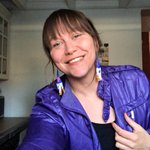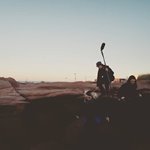ABOUT THE ARTISTS FEATURED IN THE ARTIST TALK
JAIME BLACK

Jaime Black is a multidisciplinary artist of mixed Anishinaabe and European descent. Black’s art practice engages in themes of memory, identity, place and resistance and is grounded in an understanding of the body and the land as sources of cultural and spiritual knowledge.
>> https://www.jaimeblackartist.com/
>> ON VUCAVU
COLLECTIF HAT

HAT’s work originates from various subjects, and uses different media such as light, video, and sound, to create multimedia installations and experimental short films. In their cinematographic exploration and their artistic work, the artists never confine themselves to a specific genre. Using various techniques like time-lapse, animation, projection mapping, and field recording manipulation, their work is at the crossroads of digital and analogue worlds.
HAT is formed by three artists (Hyacinthe Raimbault, Angie Richard, Tracey Richard) with different backgrounds who share their skills to create art installations, experimental films, and VJ projections for live concerts. Since 2018, their work has been showcased at several festivals throughout the Maritimes (RE:FLUX, Inspire, Messtival, Third Shift, Area 506, Lumière, Nocturne) as well as nationally from coast to coast (Dawson City, Vancouver, Montréal...) and internationally in Louisiana and Paris.
>> www.collectifhat.ca/
ABOUT THE CURATORS
ALEXANDRA GELIS
Alexandra Gelis is a Colombian-Venezuelan artist, educator and researcher living between Canada, Panama and Colombia. Her practice is research-based, process-oriented and multi-disciplinary including film, photography, drawing, and media installation with custom-built interactive electronics and sound. Her projects incorporate personal field research as a tool to investigate the ecologies of various landscapes by examining the traces left by various socio-political interventions. From her plant-based research-creation: she explores, documents and re-creates ecologies that take shape between plants and people, and between plants and their multi-species interrelationships. The idea of plants as political allies and as actors is central to her concept of "Migrated Plants".
Gelis has exhibited in film festivals and exhibitions internationally in the Americas, Europe and Africa. The Walker Art Center; Oberhausen Short Film Festival; Bienal del Sur; Internationale Kurzfilmtage Winterthur; Images Festival Toronto; ArtworxTO. Toronto; Oboro, Montreal; Museum of London (CA); YYZ Gallery; Museo de Arte Contemporáneo de Montevideo; Recoleta Cultural Center, Buenos Aires; LABOCINE; Kuala Lumpur Experimental Film; Alucine latin media festival; Vancouver Latin Film Festival; Dresdner schmalfilmtage; Pleasure Dome; Museo la Tertulia; Espacios Revelados / Changing Places; The Paseo Project New Mexico; and others.
She has given talks at Kassel and Documenta Institute, Germany; Laboratorio Arte Alameda, Mexico City; University of Zurich; and many arts and food sovereignty conferences.
Alexandra has been the recipient of numerous awards and fellowships. She has curated several shows across Canada and South America the last few years.
>> https://alexandragelis.com/
>> ON VUCAVU
MADI PILLER
Madi Piller is a filmmaker, animator, and independent curator currently living and working in Toronto, Canada. Born in Lima, Peru, she began shooting Super 8 while working as the director of production at the J. Walter Tompson ad agency in Colombia. When she moved to Canada in 1999, she became involved in the grassroots, not for profit artist-run centre scene. She has worked as a volunteer, over a decade, tirelessly creating programming, promoting the production, distribution, and exhibition of independent animated work. For that she received the Ontario Citizenship Volunteer award in 2015. She is a founding member and lead Artistic Director at PIX FILM Collective, a community advocate, helping to organize and inspire others to share conversations old and new multimedia innovations for which she created the PIX FILM in 2015 the Studio Immersion Program, supporting more than 30 artists to date. Madi has also a supportive role in the production of an animated LGTBQ docu- web-series How to Get a Girl Pregnant.
Her Curatorial projects include: Eleven in Motion: Abstract Expressions in Animation (2009), Hello Amiga (2012), OP ART Re-Imaged: Imaginable Spaces (2014), and The Frame is the Keyframe: Frame Anomalies (2016). From A to Z in Vienna (2018), My Home Here in Peru (2019), View/Regard – PIX FILM Window screening and Augmented Reality Postcards (2020), Augmented Reality MOVEMENT: Toronto<>Vienna (2021). Art et Imaginaire Toronto<> Vienne (2022), Site Unseen: Augmented Reality by Latinx Artists (2022).
>> https://www.madipiller.com/
>> https://www.pixfilm.ca/
>> ON VUCAVU
This programming series is presented by VUCAVU.

VUCAVU acknowledges the generous support of the Canada Council for the Arts.
